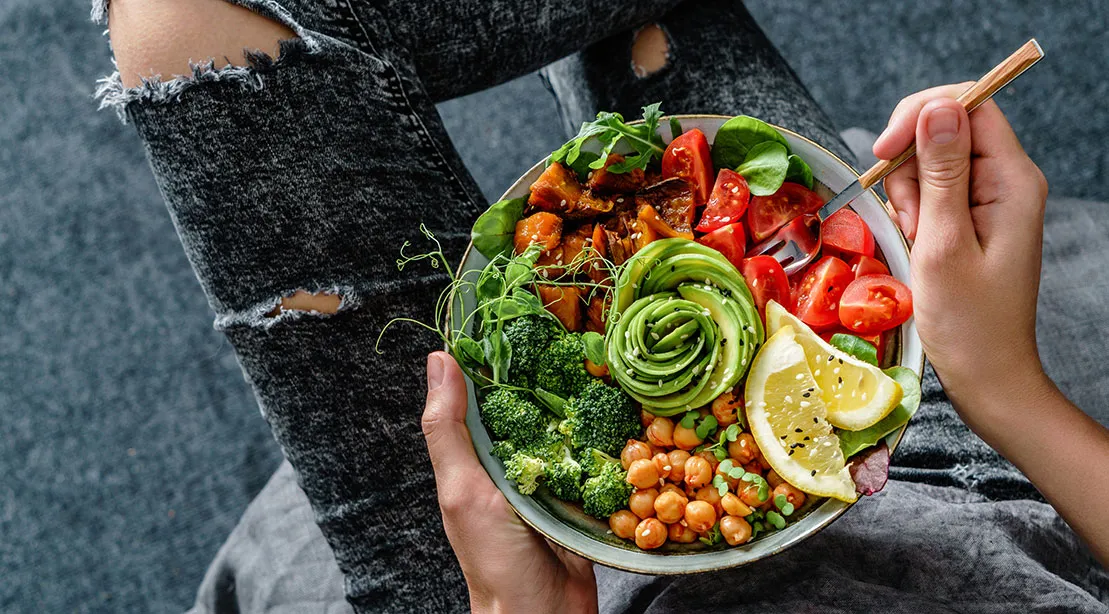Veganism involves eliminating all food containing meat, fish or poultry to improve cardiovascular disease risk factors like cholesterol and blood pressure while simultaneously decreasing body weight and extra fat deposits.
Strength athletes from Olympic weightlifter Clarence Kennedy to record holding strongman Patrik Baboumian have proven that plant-based diets can fuel top performance for all athletes from professional athletes to weekend warriors!
Protein
No matter if you are an elite athlete or simply exercising regularly, fueling your body with protein is key to meeting its requirements. Plant-based protein can be an easy and delicious way to meet these requirements; helping build and repair muscle fibers so you can perform at your peak performance level while also regulating blood sugar levels, protecting bones, and keeping hair thriving. People may worry that becoming vegan or vegetarian might prevent them from meeting protein needs; but with some planning ahead and the appropriate selection of plant-based foods this can easily be achieved.
Plant-based diets not only meet protein needs, but they provide essential vitamins and nutrients essential for performance and recovery. According to a recent study published in Nutrients, endurance athletes who consume a plant-based diet experience greater heart health benefits, more energy and quicker healing times compared with athletes who consume animal products.
A well-rounded plant-based diet contains all of the essential amino acids needed to fuel an exercise session and provide protein for muscle building, repair and growth. Good sources of complete proteins include soy-based products, beans, lentils, nuts seeds and quinoa.
Some plant-based foods contain prebiotic fiber, an essential component for gut microbe health and protein absorption. By eating such food regularly, prebiotic fiber may also help your body better utilize all the protein it consumes.
Beta-alanine is another essential nutrient for athletes. Studies have revealed its ability to enhance high intensity workouts by buffering excess protons, neutralizing free radicals and decreasing fatigue. If you are an endurance athlete it is advised that you consume 4-6g daily of beta-alanine in your diet.
Another set of nutrients essential to athletes regardless of dietary choices include B12, iron, calcium and carbohydrates. These vital components provide energy, oxygen and maintain strong bones; vegans/vegetarians may need to supplement their diets with multivitamins or nutritional supplements to ensure they’re getting enough of these essential vitamins.
Carbohydrates
Carbs are one of the body’s primary energy sources for intensive physical activity. Once digested, carbohydrates provide quick energy boosts that fuel muscles during exercise while replenishing glycogen stores – the primary energy reserve of our bodies. Carbohydrates can be found in fruits, vegetables, grains and starches; plant-based athletes need adequate amounts to fuel themselves successfully.
Protein provides minimal energy needs but plays a significant role in building and sustaining muscle tissue. Average sedentary adults require around 0.8 grams per kilogram of bodyweight daily of protein intake; athletes or those engaged in intense physical exercise may require higher amounts. Plant-based proteins can be found in beans, nondairy milks, nuts, seeds and soy products like tofu, tempeh and veggie burgers.
Vegans need to pay particular attention when it comes to meeting their protein intake requirements without animal sources of food, which requires thoughtful food selection and meal planning. Athletes also benefit from including plenty of carbohydrates, fats and fiber in their diet to meet energy demands – especially intense athletes who require ample protein levels in order to meet energy demands.
An athlete’s carb needs can vary significantly, depending on their sport of choice; an ultra marathon runner will have very different nutritional needs than a world record-setting strongman, for instance. As a rule of thumb though, eating healthily plant-based food is an ideal way to maximize athletic potential and reach one’s full athletic potential.
There are numerous success stories of athletes like olympic marathon runner Steve Reeves and renowned strength coach Robert Cheeke, who have found great fitness success on a plant-based diet. Provided they follow an appropriate, well-rounded plan including plenty of whole foods, plant-based eating can provide amazing fitness gains across a range of ages and abilities.
Fats
Attitude plays a key role for endurance or strength athletes who require healthy fats as an energy source during exercise and also play an integral part in keeping joints lubricated and healthy. Athletes should aim to get 50-60% of their caloric intake from monounsaturated and polyunsaturated fat sources such as monounsaturates.
Nuts, seeds, avocados, olives, whole grains and vegetable oils are great sources of dietary fats for vegans, while these foods can also be found in tofu, tempeh, soy milk nut milks beans and dark leafy vegetables.
Vegetarians need to ensure they consume an appropriate amount of fatty acids, specifically omega-3 and omega-6 fatty acids, in order to support brain, eye, cardiovascular, and mental health. Vegans can get this necessary nutritional boost from various foods like nuts, seeds, avocados, olive oil and tofu.
Carbs provide athletes with energy during long exercise sessions and events. A diet rich in carbs has also been shown to increase endurance performance while decreasing body fat levels, aid in recovery, and decrease delayed-onset muscle soreness (DOMS). Vegan athletes can find enough carbohydrates in their diet from grains, legumes, vegetables, and fruit sources.
Protein is essential to building and repairing muscles, and vegan diets can satisfy most athletes’ protein requirements as long as it includes a wide variety of plant-based foods and protein supplements. Athletes should aim to consume between 1.6-2g per kilogram of bodyweight every day.
Athletes must also pay close attention to their vitamin D intake. This vital nutrient plays an essential role in bone and muscle health and can be found through exposure to sunlight, fortified foods or supplementation.
Athleticians seeking to enhance short-term, high-intensity exercise should consider taking creatine supplements if they wish to enhance performance in such exercises. Creatine is an amino acid converted into phosphocreatine by the body during physical exertion; this allows energy production and ATP during workouts to increase. While meat products contain creatine as well as its supplement form powder can also be added into vegan diets for improved performance.
Vitamins & Minerals
Vegan diets are nutritionally-dense and include foods from multiple categories: vegetables, fruits, whole grains, legumes, nuts and seeds. Veganism offers athletes essential calcium, iron, zinc folate niacin potassium magnesium selenium phosphorus vitamin B12. A plant-based diet can meet energy demands of athletes while increasing performance; however it must be planned carefully so as to meet all nutritional requirements properly; otherwise nutrient deficiencies could arise which require professional guidance from registered dietitians in planning their food intake.
Plant-based diets contain phytochemicals and antioxidants that can reduce inflammation in the body and thus improve performance. Furthermore, veganism has many additional advantages for digestive system and gut health: for instance, veggies and fruit found within plant-based diets travel quickly through digestive systems without disturbing bacteria in stomachs; on the other hand processed foods such as pizzas, burgers, chips and meat can be hard to digest, which could disrupt healthy balance within stomach bacteria.
Vegan diets may help athletes reduce the risk of musculoskeletal pain. Athletes frequently suffer from overuse injuries to muscles, bones, ligaments and tendons following long workouts or high-performance events – however with careful planning a vegan diet can prevent such instances of pain from occurring.
Noteworthy is also that a vegan diet can prevent diseases common among athletes such as heart disease and diabetes, due to being low in fat and fiber and providing sufficient amounts of protein, carbohydrates, vitamins, and minerals. Therefore it’s highly advised that athletes follow a vegan diet as this will not only help them reach their goals more efficiently but will also keep them healthier overall while being better for the environment by not necessitating animal farming for food sources.

